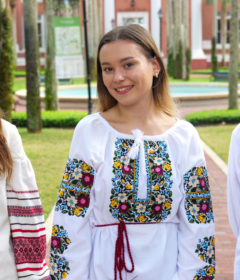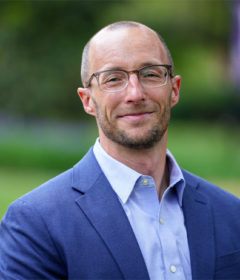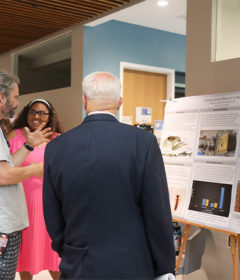The Cuba Forum: ‘An opportune moment to discuss U.S.-Cuban relations’
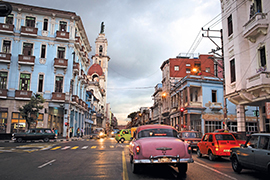
Angel de Fana was arrested by the Castro regime in 1962 and thrown in prison for 20 years and seven months for counter-revolutionary activities.
He was sent to a forced labor camp, where inmates routinely were murdered, he said. At one point, he was locked in a 3-foot-by-6-foot cell sealed with metal planks for total darkness and isolation, living only with rats and roaches.
“Was I present when political prisoners were killed? Yes,” de Fana, 77, said Wednesday night, Nov. 9, at Stetson University. “With my own eyes, I have witnessed fingers being cut off with a machete. … I swear to you that these horrendous actions happened.”
De Fana was one of four panelists who debated the pros and cons of expanding relations between the United States and Cuba at Stetson’s Cuba Investment Forum, which attracted more than 150 students, faculty, staff and others to the Stetson Room on the DeLand campus.
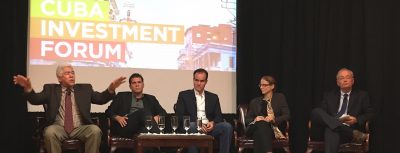
Stetson President Wendy B. Libby, Ph.D., and Stetson alumnus, Leopoldo “Leo” Fernandez Pujals, who was exiled from Cuba at age 13, wanted the university to host the academic forum to discuss opposing views on whether U.S.-Cuban relations should be expanded or rolled back.
Stetson University students visit Cuba for international study, but anti-Castro exiles like Fernandez say the students don’t see the true reality of the Communist regime and instead enrich the Castro family, which owns the hotels, restaurants and other tourism-related businesses on the island.
President Obama re-established ties with Cuba nearly two years ago, easing restrictions on travel and trade, and pushing Congress to repeal the 56-year-old embargo. But the future of those policies now are in question, with Donald Trump’s election Tuesday to president, said Stetson Political Science Professor Eugene Huskey, Ph.D., who moderated the panel.
“President-elect Trump over the last few weeks has talked about rolling back our relations with Cuba,” Huskey said. “This is a particularly opportune moment to discuss U.S.-Cuban relations.”
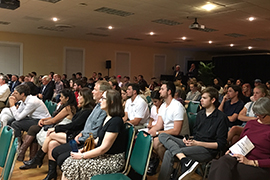
Ricardo Torres, Ph.D., an assistant professor of economics at the University of Havana, said Cuba has undergone significant changes since the Soviet Union collapsed 25 years ago. Those changes have accelerated in the past seven years, with more private businesses opening and about 30 percent of Cubans now working outside the public sector. Cuba has moved from isolation into the world economy and is expected to sign a broad trade agreement with the European Union in December, he said.
He challenged the basis for America’s embargo and economic sanctions, saying he doesn’t believe they are about human rights violations. If they were, then the United States would impose embargoes on China and Saudi Arabia, where human rights abuses also occur.
“This is about economic interests. The U.S. cannot afford to put an embargo on Saudi Arabia,” he said. “It’s not the concern of human rights. Cubans don’t buy that argument.”
The U.S. embargo should be repealed because it “hasn’t worked so far” and likely won’t work in the future, he added.
“Frankly, I think the largest burden of those sanctions are on the shoulders of ordinary Cubans, not the government,” he said. “I’m very concerned about the life of ordinary Cubans – many of them face economic hardship on a daily basis.”
The average Cuban lives on about $20 a month. Because they work for businesses owned by the Cuban military and the Castro family, the state employment agency takes 92 percent of their wages, said Mauricio Claver-Carone, executive director of the Cuba Democracy Advocates in Washington, D.C., which advocates for human rights and democracy in Cuba.
Restoring relations is funneling money to the Castro family, which has a monopoly on businesses there, he said.
“In Cuba, foreign trade and investment are the exclusive domain of the state – in other words, the Castro family. There’s no exceptions,” Claver-Carone said.
The Castro regime’s confiscation of U.S. assets was the “largest uncompensated taking of American property by a foreign government in history,” he said. “The Castro regime would be all too happy really for the U.S Congress to unconditionally lift sanctions and, therefore, lease back to you the stolen property that was taken from another group of Americans.
“That’s a great deal for them, but it causes harm and frankly it’s a miscarriage of justice to its victims,” Claver-Carone said.
Claver-Carone disputed statements that opening trade and tourism on the island will “trickle down” and benefit ordinary Cubans.
But Emily Morris, Ph.D., a Research Fellow at University College London’s Institute of the Americas who studied Cuba for more than a decade, said Cubans are living better than they once did.
“As I showed trade has increased, it’s hard to argue that hasn’t trickled down at all to the Cuban people. It certainly has and certainly made life easier than it was 10, 15 years ago,” she said.
“The process of change is underway,” she said. “It may be very, very slow. It may be very, very controlled, but the control cannot hold because the young generation is changing. Basically, it’s like the siege mentality in Cuba.”
De Fana, the former political prisoner, hopes the siege ends and he can return to Cuba “as soon as possible.” He’d like to drink café without the police around and sip Mojitos – which brought a shared smile with Torres, the professor from Havana, who was seated next to him.
“That’s what I want, I really want,” de Fana said.
-Cory Lancaster

